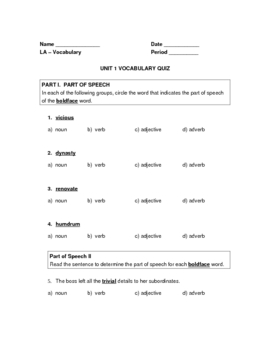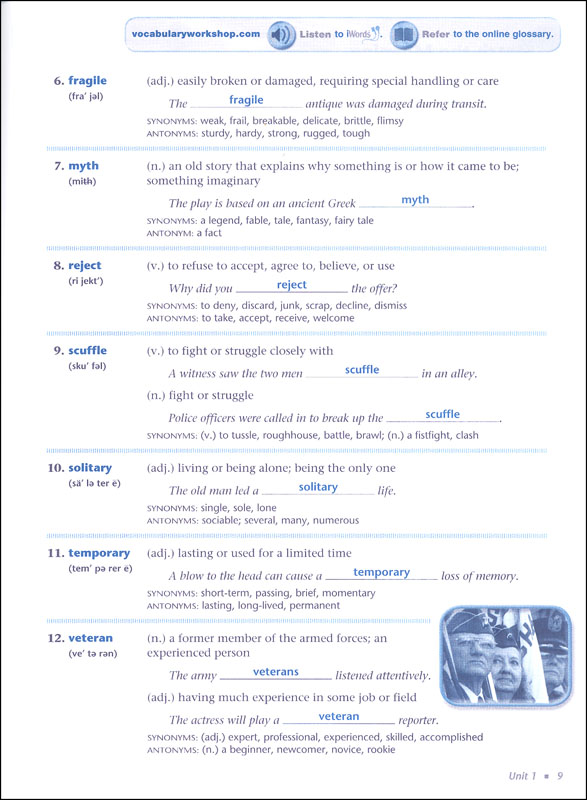As a student, I vividly remember the struggle of navigating complex vocabulary lists. Trying to memorize lengthy definitions and then apply them in context felt like an uphill battle. It wasn’t until I discovered the importance of understanding the nuances of each term that vocabulary truly started to click. Just like building a house requires strong foundations, vocabulary acquisition forms the base of effective communication and understanding. Vocabulary Workshop Level B Unit 1 delves into these crucial building blocks, offering a comprehensive exploration of key terms. This article will guide you through the answers to this valuable unit, empowering your vocabulary growth and confidence.

Image: www.teacherspayteachers.com
This unit, focused on words we frequently encounter in daily life, lays the foundation for a richer vocabulary. By understanding each word’s meaning, its synonyms and antonyms, its contextual usage, and common pitfalls related to misspelling or misuse, you develop a deep comprehension that goes beyond simply memorizing. This kind of understanding unlocks the ability to express yourself more precisely, engage in meaningful conversations, and better comprehend the complex world around you.
Unraveling the Secrets of Vocabulary Workshop Level B Unit 1
Vocabulary Workshop Level B Unit 1 presents a carefully curated selection of words, each chosen for its relevance and significance in everyday life. The unit aims to equip students with the linguistic tools needed to navigate academic and professional discourse effectively. Mastering these essential words not only enhances your vocabulary but also cultivates critical thinking and problem-solving skills. Let’s delve into the specific words and their accompanying exercises, providing a comprehensive analysis to unlock the full potential of this unit.
Word 1: **Abate**
The word **abate** means to decrease in intensity or severity. It is a dynamic verb indicating reduction, typically in reference to something negative such as pain, anger, or turmoil. For example, “The storm’s fury began to abate as the sun peeked through the clouds.” Understanding the usage of **abate** allows you to express nuanced concepts related to decline, reduction, or lessening. The exercise in this unit may require you to identify sentences where **abate** is used correctly or to differentiate its meaning from similar words such as **diminish** or **lessen**.
Word 2: **Abridge**
**Abridge** signifies the act of shortening something, often by omitting details. Think of it as a condensed version of a longer text. When you **abridge** a book, you create a shorter version while retaining its essential message. This word is particularly important in contexts of summarizing, condensing, or simplifying information. Exercises may require you to identify phrases where **abridge** is used correctly or to differentiate it from terms such as **summarize** or **condense**.

Image: learningcampusabend.z4.web.core.windows.net
Word 3: **Aberrant**
**Aberrant** describes something that deviates from the norm or expected behavior. It signifies an anomaly, an outlier, or something that goes against typical norms or patterns. For example, “The scientist observed an aberrant pattern in the data, which indicated a potential flaw in the experiment.” The exercises may ask you to identify scenarios where **aberrant** applies or to distinguish it from synonyms like **abnormal** or **unusual**.
Word 4: **Abolish**
**Abolish** implies complete and permanent eradication or elimination. It’s a powerful word conveying a definitive end to a practice, law, or institution. For example, “The activists worked tirelessly to abolish slavery and ensure universal human rights.” Exercises may challenge you to identify contexts where **abolish** is used appropriately or to differentiate it from words like **cancel** or **eliminate**.
Word 5: **Abortive**
**Abortive** characterizes an action or plan that is unsuccessful, incomplete, and ultimately fails to achieve its intended purpose. It denotes an attempt that ends prematurely or without achieving its goal. For example, “The rebels’ attempt to overthrow the government was abortive, resulting in their capture and imprisonment.” Exercises may involve identifying situations where **abortive** applies or differentiating it from similar words like **failed** or **unsuccessful**.
Word 6: **Abscond**
**Abscond** refers to leaving secretly and hastily, often to avoid legal consequences or responsibilities. It implies a stealthy and hurried departure, usually to escape punishment or detection. For example, “The thief absconded with the stolen jewels, leaving no trace of his whereabouts.” The exercises may ask you to identify scenarios where **abscond** is used correctly or to differentiate it from related words like **flee** or **escape**.
Word 7: **Abstract**
**Abstract** can refer to a concept that is theoretical and not concrete. It is often used to describe ideas or concepts that are not readily understood through the senses but rather through intellectual reasoning. In another sense, **abstract** can also describe a summary of a longer text. This duality highlights the word’s ability to signify both theoretical and condensed concepts. Exercises may require you to identify situations where **abstract** is used in either of these senses or to differentiate its meaning from other words like **theoretical** or **summary**.
Mastering the Art of Vocabulary: Tips and Techniques
Vocabulary acquisition is a continuous journey, not a destination. While mastering Level B Unit 1 may seem daunting, it’s a crucial step in building a strong foundation for your language skills. Here are some actionable tips to maximize your learning and make the process more enjoyable:
-
Context is King: Don’t just memorize definitions. Instead, understand how each word is used in various contexts. Read the examples provided in the unit carefully and try to identify how the vocabulary word is being used in the sentence.
-
Active Learning: Engage actively with the material instead of passively reading. Create flash cards, write sentences using the new terms, and even try teaching the words to someone else. Active learning boosts retention and deepens your understanding.
-
Relentless Curiosity: Whenever you encounter a new word, make it a habit to look it up and investigate its nuances. Pay attention to its synonyms, antonyms, and the origins of the word. This ongoing curiosity will foster a natural love for language.
Remember, vocabulary expansion is a journey of exploration and discovery. Embrace the challenge, celebrate each new word learned, and trust in the power of continuous learning.
Frequently Asked Questions (FAQ)
-
Q: What is the best way to memorize the words in this unit?
- A: Avoid rote memorization. Focus on understanding the nuances of each word through contextual examples and active learning strategies like flash cards or creating your own sentences.
-
Q: Are there any online resources that can help with Vocabulary Workshop Level B Unit 1?
- A: Several online resources offer practice exercises and explanations for Vocabulary Workshop Level B. Search for “Vocabulary Workshop Level B Unit 1 answers” or “Vocabulary Workshop Level B Unit 1 quizzes” to find additional support materials.
-
Q: How can I apply these words in my everyday life?
- A: Pay attention to your reading, listening, and conversations. Actively seek opportunities to use these words in your writing, speaking, and daily interactions. Practice makes perfect!
Vocabulary Workshop Level B Unit 1 Answers
Conclusion
Mastering Vocabulary Workshop Level B Unit 1 is a giant step toward building a strong and versatile vocabulary. This unit equips you with the tools to navigate complex language, express yourself with precision and nuance, and enhance your understanding of the world around you. By embracing active learning techniques and engaging with the material with curiosity and enthusiasm, you can unlock the full potential of this valuable resource. Are you ready to embark on your journey of vocabulary mastery?






